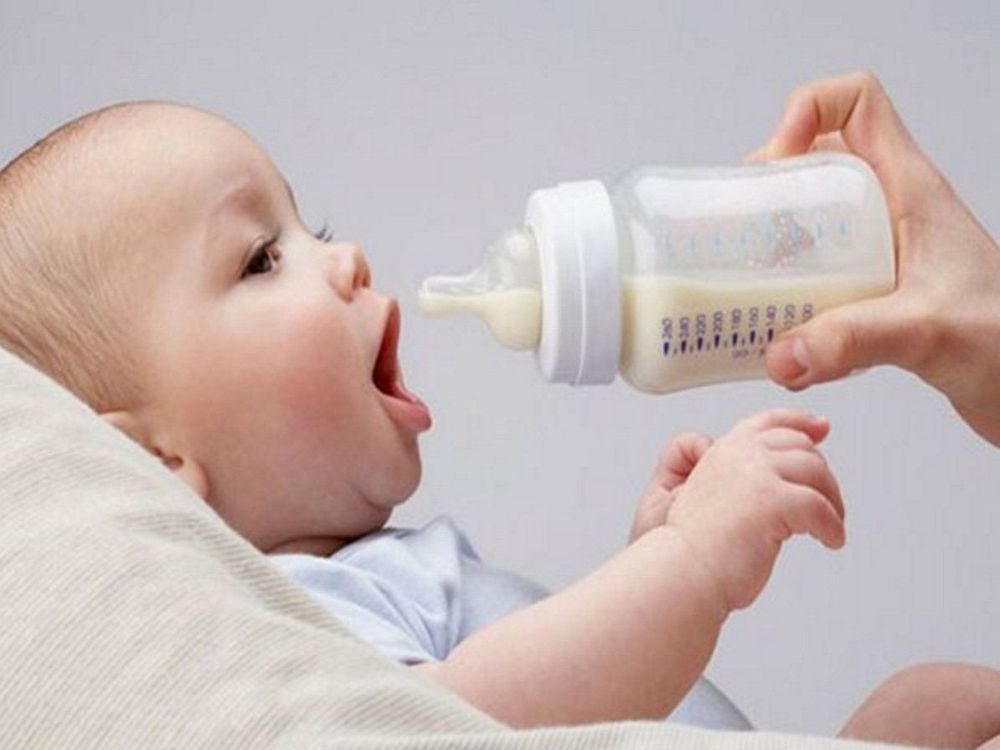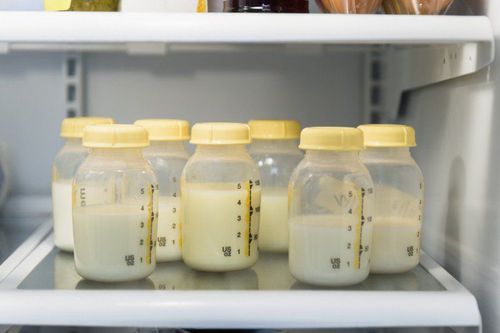This article was reviewed by Dr. Ho Thi Hong Tho - Neonatologist - Pediatrics - International General Hospital Vinmec Phu Quoc.
Sudden weaning can make both mothers and babies struggle to adapt to significant physical and emotional changes. This often arises from a necessary situation or the mother's decision. Regardless of the reason, mothers should look into various weaning methods to make the most beneficial choice for both themselves and their babies.
1. What is sudden weaning?
Sudden weaning, often referred to as abrupt or unexpected weaning, implies the rapid cessation of breastfeeding. Sometimes, the weaning process occurs hastily due to an unexpected situation or emergency. Additionally, it may stem from the mother's deliberate decision to stop breastfeeding at a certain time.
Overall, whether weaning is intentional or unavoidable, it can have a considerable impact on the health of both mother and baby at that time.
2. The difference between sudden and gradual weaning
When weaning suddenly, there is little time to prepare yourself and your child for the unexpected physical and emotional changes. Without the opportunity for the body to adapt to these rapid changes, the weaning process becomes more challenging and can lead to unwanted complications for both mother and baby.
Sudden weaning is in contrast to gradual weaning. Gradual weaning entails a slow transition from breastfeeding to another source of nutrition. If you choose to wean your child, it is best to do so gradually and slowly.
Gradual weaning helps prevent breast-related issues or other complications related to weaning. Additionally, this method tends to be less traumatic for the child. Breastfeeding is the best way to provide nutrition for infants, offering a safe source of nourishment while providing comfort to both mother and baby.
Some children may wean without fuss, while others may face more challenges, particularly when the process is too fast and abrupt.
3. Why do some women choose sudden weaning for their children?
There will certainly be cases where a mother has to wean her child suddenly due to urgent medical situations.
However, in many cases, we can proactively avoid sudden weaning. It's best to have a thorough discussion with a doctor or lactation consultant about breastfeeding to determine if it's necessary or if there are alternatives to breastfeeding.

Here are some primary reasons many women decide to abruptly stop breastfeeding:
- Starting new medication: Some prescription medications cannot be taken while breastfeeding. If a doctor prescribes medication that is incompatible with breastfeeding, ask if a safe alternative is available. However, if your health depends on a medication that isn't compatible, such as chemotherapy for cancer treatment, you may have no choice but to wean.
- Illness, hospitalization, or surgery: If you're experiencing a minor illness, such as a cold or stomach ache, you may continue breastfeeding. However, if your illness is severe enough to require hospitalization or surgery, it’s likely you'll need to wean your child abruptly.
- Forced separation from the child: If you must be away from your child for an extended period, such as going back to work, you may not be able to breastfeed. If you plan to resume breastfeeding when you return home, be sure to pump frequently to maintain your milk supply. This can indeed be challenging and time-consuming, leading many mothers to choose to wean suddenly.
- Peers and social pressure: Criticism and pressure from partners, family, or friends regarding breastfeeding may lead a mother to decide on sudden weaning, especially if the child is getting a bit older.
- New pregnancy: It’s not always necessary to stop breastfeeding due to a new pregnancy. However, breastfeeding during pregnancy can lead to uterine contractions and may pose a higher risk for those who are prone to miscarriage or premature labor. Thus, weaning may be a safer option.
4. How does sudden weaning affect mothers?
Weaning can significantly affect a mother's physical health, hormones, and emotions. When weaning gradually, you will have time to mentally prepare for and embrace the physical changes. However, abrupt weaning can greatly impact your body, leading to several effects such as:
- Soreness in the breasts
- Breast infections causing mastitis, blocked milk ducts, or breast abscesses due to engorgement
- Milk fever, a flu-like condition with symptoms such as fever, chills, and muscle weakness
- Breast milk leakage, which may take months to fully cease
- Return of menstruation and fertility

- Abrupt Weaning and Depression in Women: When abrupt weaning is not what you desire, or is forced upon you, it can bring feelings of sadness, disappointment, anger, and guilt. Even if you expect the end of breastfeeding, you may be surprised to find yourself feeling a sense of loss when it ends too suddenly. This feeling of sadness can be stronger in women who have had depression in the past. It's best to talk with your partner, family, or friends and share your feelings with them. You may also join a support group for mothers who are in the breastfeeding phase to receive help and answer questions about weaning. If you’ve had depression or mental health issues in the past, seeking guidance from healthcare professionals can help you find a reasonable solution for both you and your child. On the other hand, hormonal changes can affect your emotions in various ways, so monitor your body’s changes closely during this time.
- Coping with Abrupt Weaning: Although abrupt weaning can lead to discomfort and sadness, you can overcome these negative emotions by applying the following strategies. To alleviate physical discomfort, you can express some breast milk. You can hand express or use a breast pump to relieve pressure and pain. However, you should only express a moderate amount to avoid increasing milk production. Additionally, you should wear a supportive bra; however, it should not be too tight. Choosing a bra that is too constricting can lead to blocked milk ducts or breast infections. Applying cold compresses or using chilled cabbage leaves on the breasts can soothe swelling and pain from engorged breasts. Persistent cold compresses can effectively reduce milk production. Additionally, medications such as Motrin or Tylenol can be helpful in reducing breast pain, but you should consult a doctor before using them. Some herbs like sage, parsley, and peppermint may also help decrease milk production. The engorgement from abrupt weaning can create additional pressure in your breasts. This pressure can lead to milk leakage at random times, especially when you hear your baby cry. In this situation, wearing breast pads in your bra can help absorb leaking milk.
5. How Does Abrupt Weaning Affect the Baby?
Gradual weaning allows the child to adapt to new sources of nutrition and become accustomed to the loss of comfort and security provided by breastfeeding. Therefore, when weaning the child suddenly, it can affect them in various ways. Babies may refuse to take a bottle, especially if you are trying to introduce it. Some infants may cry, feel sad, or temperamental due to the abrupt end of breastfeeding. For infants, sudden weaning can lead to increased illness. Breastfeeding helps prevent common illnesses in young children, so unexpected weaning may result in a higher risk of ear infections and respiratory infections.
Helping Your Child Wean: To meet your child's natural sucking needs, you can offer them a pacifier. Additionally, you should provide them with toys they enjoy to comfort them. If you can’t bottle-feed your baby, let someone else try, especially if the baby has never taken a bottle before. For babies older than six months, you might skip the bottle and transition directly to a cup. For older children, you should distract them during the times when you usually breastfeed and begin establishing new routines, such as going for walks, playing games, or engaging with another child.

What to Feed Your Child When Weaning: When weaning your child, you will need to provide them with an alternative source of nutrition. If you have frozen breast milk available, you can continue feeding them breastmilk from a bottle. However, if you do not have breast milk, what you feed your child will depend on their age.
For children under 1 year old, doctors often recommend that mothers choose a formula specifically for infants. At around 6 months, babies can start to add solid foods while still combining them with infant formula. You should continue to feed your child solid foods along with formula for about a year.
When the child reaches one year old, they will need more nutrition from different food sources, so you can transition from infant formula to cow's milk. However, some children may also use toddler formula instead of cow's milk. To effectively and safely choose alternatives to breastmilk, it is advisable to consult with healthcare professionals.
For children to be healthy and develop well, they require a balanced diet that ensures both quantity and quality. If children are not provided with adequate and balanced nutrients, it can lead to either an excess or deficiency of nutrients, negatively affecting their overall physical, mental, and motor development.
Children who do not eat properly may be at risk of lacking trace minerals, leading to symptoms such as poor appetite, stunted growth, and malabsorption. If parents notice any of these signs, they should consider supplementing their child's diet with products containing lysine, essential trace minerals, and vitamins such as zinc, chromium, selenium, and B vitamins to meet the child's nutritional needs. These essential vitamins also aid digestion, enhance nutrient absorption, and help improve appetite, making meals more enjoyable for the child.
Reference sources: verywellfamily.com , babycenter.com
To arrange an appointment, please call HOTLINE or make your reservation directly HERE. You may also download the MyVinmec app to schedule appointments faster and manage your reservations more conveniently.









